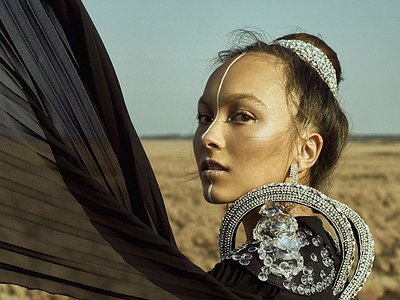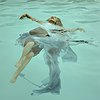Part 1
Name: JOPLYN
Nationality: German-Vietnamese-Canadian
Occupation: Singer, producer
Current Release: Pappelallee on Stone Free Berlin
Recommendations: “Losing the sense of taste” by Spanish director Maria de Castro is a short film that explores, similarly to your question below, the overlaps between our senses, as well as the idea of innocence and memory. It’s a must watch!
My all-time favorite song that always calms me down and grounds me is Nicolas Jaar’s “Colomb.” I don’t know why, but that particular song just connects with me. I’ve been listening to it for 8 years now, sometimes more, sometimes less. But whenever I haven’t heard it in a long time and play it - that is the warmest feeling ever.
If you enjoyed this interview with JOPLYN, visit her facebook page for recent updates, music and more information.
When did you start writing/producing music - and what or who were your early passions and influences? What is about music and/or sound that drew you to it?
First of all, hello. This is Joplyn from Berlin, nice to meet you. Songwriting for me began simply as a way to bring the poems I had written ever since I was 6 or 7 years old to life. After my dad had sat me down at the piano and showed me how to play chords, I started coming up with melodies and rhythms, and everything evolved from that. I think I was about 9.
Producing was the next step in the process. I wanted to record what I wrote and soon after got into Garageband, 2 years later Ableton, synths, EQ, compression etc. Music to me in the beginning was just a distraction from the mundane every-day life I was living, a place where I could explore who I really was and what I could create on my own without anyone else present.
I think every musician is going to agree with me when I say, once you start making music, you can’t listen to other music like everyone else anymore. No matter if you want to or not, you start analyzing what you’re hearing, envisioning how you could translate that into your own work. Listening to my favorite artists at the time, Lorde, Banks, The xx, was the second thing that drew me to music. I just wanted to be like them and create like they were creating.
Another thing that drew me to music later on was the fact that it’s one of the only universal languages out there. Everyone can understand it, no matter where they’re from. I think that’s so beautiful.
For most artists, originality is first preceded by a phase of learning and, often, emulating others. What was this like for you? How would you describe your own development as an artist and the transition towards your own voice? What is the relationship between copying, learning and your own creativity?
Like I mentioned, I spent the first few years of making music simply trying to sound like all my idols did. When I released my first single in 2017, I was still, sonically, in that realm of electronica that the artists I listened to were. In 2018 however, things shifted. As I started listening to a lot more American music, like rap and hip hop, without even realizing it, my style of songwriting changed along with what I was consuming. I started straying further and further away from my original musical identity - using breakbeats and rapping in my songs. Even the language in my song lyrics noticeably changed. It felt like was trying to mirror something that I simply was not.
Only at the beginning of last year did I realize this, and started going back to my roots. Having lived in Berlin my entire life, being surrounded by electronic music, I know now that that’s the sound I want to stand for and that I enjoy making. It’s what I grew up on.
I wouldn’t say I have completely found my own “sound” yet, but right now I feel like I am closer than before, and more importantly, headed in the right direction. I’m in no rush to solidify who I am, instead I’m excited for the journey ahead of me. Having said that, the music I listen to nowadays is a reflection of that. I like to get inspired by other artists, and copy the feeling of something, without really copying anything identifiable. In the end, music is all about a feeling and a vibe. And art is never created in isolation.
What were your main compositional- and production-challenges in the beginning and how have they changed over time?
In the beginning I found it really hard to stick to the “rules” of songwriting, like the famous ABABCB song structure or harmony etc. My first songs, coming from poetry, were all without a real hook, just random 3-minute melodies.
Now, after years of writing songs the way everyone else does, it’s so ingrained in me that sometimes I feel like I can’t think outside of the box anymore. In my head, I always have to classify a melody as a verse, pre- chorus, chorus, after-chorus or bridge, when there really is no need. I learned now, that everything has already been done, and the magic truly happens in the unconventional, the abnormal.
Still, I don’t regret teaching myself traditional songwriting in my early steps. In the end, you have to know the rules in order to break them.
What was your first studio like? How and for what reasons has your set- up evolved over the years and what are currently some of the most important pieces of gear for you?
My first “studio” was an old laptop that had Garageband installed and an even older keyboard I had found lying around in my family’s apartment. First, I exchanged my keyboard for a new Akai one, with trigger pads and faders that I could directly link to Ableton Live. At around the same time I invested in a TC Helicon Voicelive Touch 2, a vocal effect machine that lets me play around with my vocals, loop them and add crazy effects to them. This is also something that was important for me to have for when I would play live. Then I got a new computer that could go through a whole recording session without shutting down at least once.
I borrowed an Ableton Push from a friend to shoot Instagram videos and just recently invested in some good Arturia synth plug-ins. That’s it. Everything is equally important to me.
I think the best thing is to limit yourself to things you absolutely need, and truly squeeze out every last drop of what they have to offer before you move on to the next. Especially in this oversaturated world, with free stuff getting thrown at you at every corner, it’s almost like we’re conditioned to always want “more.”
In the producer-world there’s this saying, “production is reduction.” And I think that sums it up quite well, beyond producing music.
How do you make use of technology? In terms of the feedback mechanism between technology and creativity, what do humans excel at, what do machines excel at?
Back before we had computers to make our music on, being a musician was actually a really technical profession. It was a real skill that you had to acquire through years and years of practice. That is why most of the successful musicians in that era were much older than they are nowadays. Today singers have Autotune, producers have Splice, or Output Arcade, where you press 3 keys and have a finished playback, even mastering has become accessible through Ozone 9. Believe it or not, there are some computer-sung vocals out there that sound eerily real.
The only thing machines can’t conjure up yet are stand-alone ideas that hold a societal and emotional relevance to us as people. That build up momentum, that have a cultural impact. Those things don’t come out of algorithms, they come out of experiences, sensations, that only the human brain can process. I don’t think any machine will ever replace that. And that’s the way it should be! In the end, there is balance in everything.
That’s why I’m not afraid to use technology in my music. It enables me to do things I would normally have to invest years of training and saving up to gain access to. Especially me, making electronic music, I hardly use real, tangible instruments in my music. But as long as the songs I write are purely products of my own mind, there is no need to shy away from taking advantage of technology.
Production tools, from instruments to complex software environments, contribute to the compositional process. How does this manifest itself in your work? Can you describe the co-authorship between yourself and your tools?
This is where loops from Splice or any randomized instrument, like arpeggiators can really come into play. I, personally, like to build songs up from one small idea. Sometimes that’s a melody, a lyric, but sometimes its also a loop I found somewhere or a really cool instrument I discovered on Ableton. It’s interesting how different tools make you write differently. For example, I tend to think of different chord progressions or lines on the Ableton Push than on a traditional keyboard, and depending on my mood I use either one. But all of those things are potentially only triggers for my brain to be creative - hence, I don’t believe “co- authorship” is the right term here. The authorship is still completely mine, although, you’re right, many of the things I use in it are not technically mine.
I think of this similar to the way I see sample culture. Drake’s song “Hotline Bling” is purely his, although most of the playback is Timmy Thomas’ “Why can’t we live together.” Nevertheless, that song has been lying around for decades, and no one had ever thought to make it into what it has become. Especially in rap and hip hop there are so many samples that were given new life through new ideas. It’s the combination that counts.
Collaborations can take on many forms. What role do they play in your approach and what are your preferred ways of engaging with other creatives through, for example, file sharing, jamming or just talking about ideas?
Normally, when I collaborate I am sent a playback and write on top of that. It gives you ideas you wouldn’t have thought of otherwise. I have yet to have my first collaboration with another vocalist, and rarely co- write songs jamming with someone else in the room, even though, once it’s safe again, I would love to do more of that.
However, collaboration does not have to happen jointly at all. My recent collab with Booka Shade “Polar Lights” for example, are two independently written songs, melted into one. I wrote my part years ago, recorded it, but never used it, and when the boys asked me for vocal material, I sent them a huge folder full of old stuff, and they picked it out. Then they laid it on top of a playback they had been working on, and out came the finished song. Crazy to think about!
In 2019, I was writing music for a series, on top of a moving picture, a whole different type of collab, that felt oddly innate to me.
I don’t have one preferred way to co-operate with someone on something creative. Two heads can always think of more ideas than one, and I’m thankful for any good idea that comes my way.






